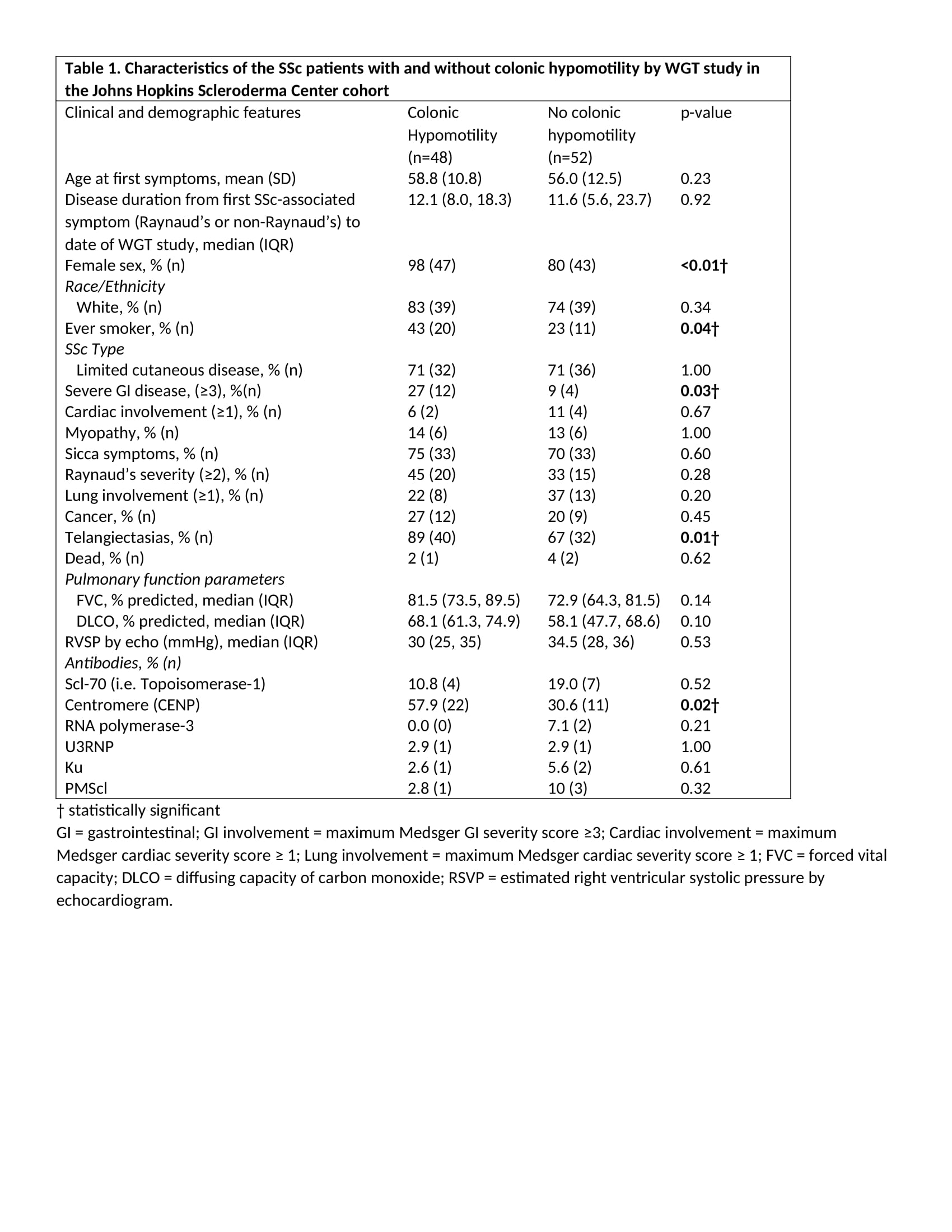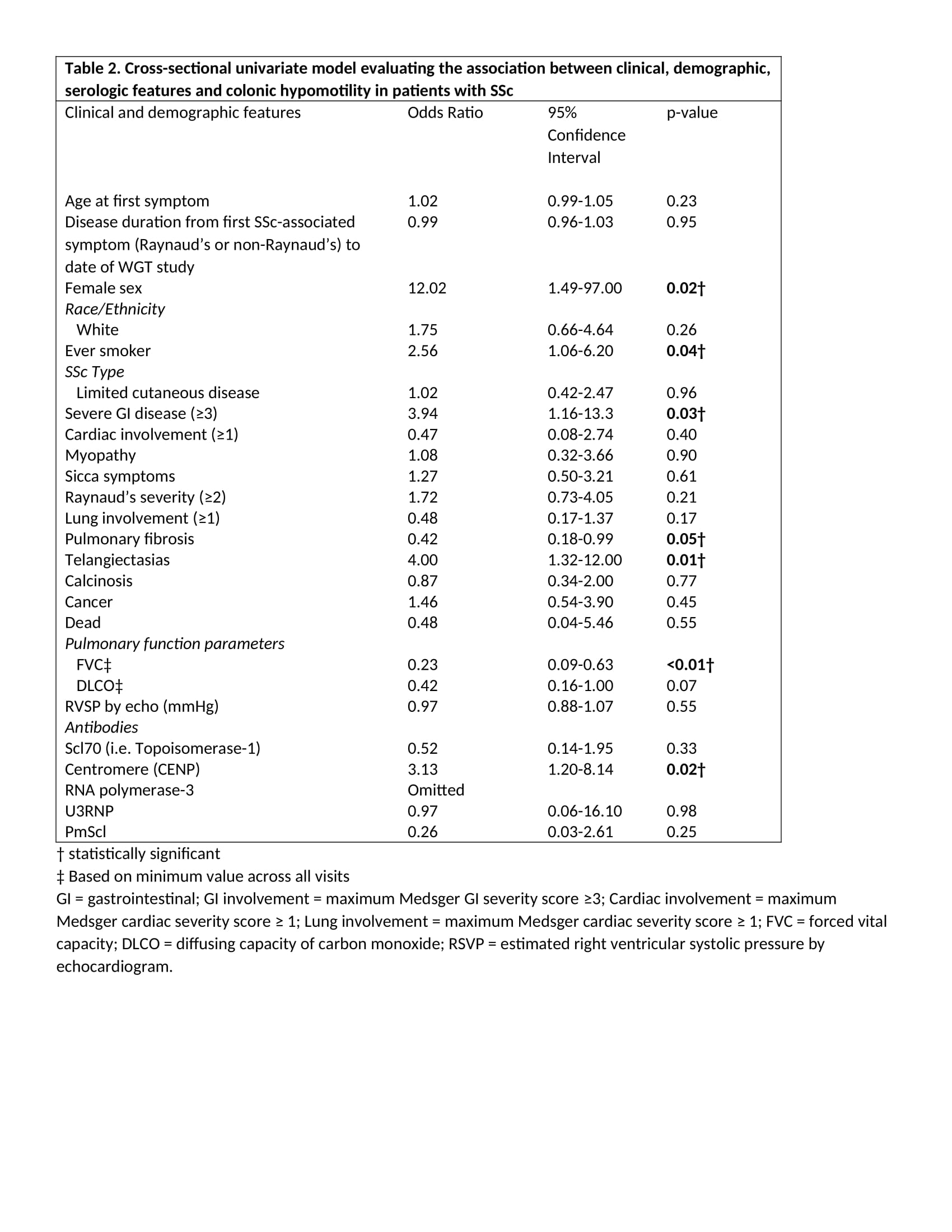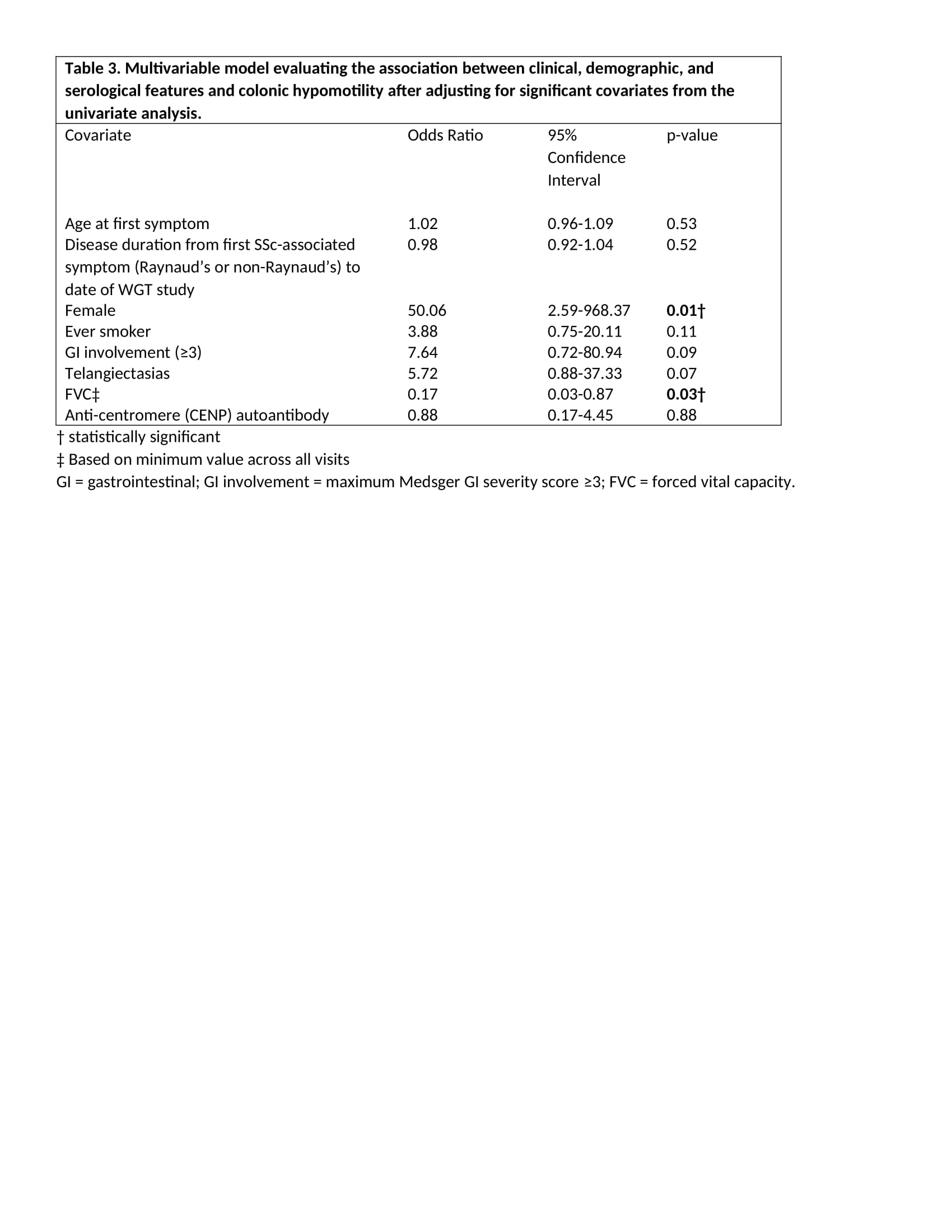Session Information
Session Type: Poster Session C
Session Time: 9:00AM-11:00AM
Background/Purpose: Colonic dysmotility affects up to 50% of patients with systemic sclerosis (SSc). While some patients have mild colonic disease, others experience severe complications, such as recurrent pseudo-obstruction and the requirement of total parenteral nutrition. Nevertheless, the clinical phenotype of patients with colonic hypomotility is not well-defined. We sought to identify the demographic, clinical, and serologic features that distinguish SSc patients with and without colonic hypomotility.
Methods: Patients with gastrointestinal (GI) symptoms from our Center who met SSc criteria were prospectively enrolled and underwent a scintigraphy-based whole gut transit (WGT) study. Eighty percent met 2013 ACR/EULAR criteria, 2% met ACR 1980 criteria, and 18% met CREST criteria. We performed a cross sectional analysis comparing demographic, clinical, and serologic features between SSc patients with and without colonic hypomotility by WGT. Clinical features were characterized using maximum severity scores recorded in the database. Univariate logistic regression was used to examine associations with colonic hypomotility. Multivariable models were then constructed using significant variables from the univariate analysis and potential confounders to determine whether the associations remained.
Results: One hundred patients with GI symptoms were enrolled and underwent WGT studies. Forty-eight percent had colonic hypomotility (i.e. < 67% colonic emptying by 72 hours of WGT study). Patients with colonic hypomotility were more likely to be female (98% vs. 80%; p< 0.01), have ever smoked (43% vs. 23%; p=0.04), have anti-centromere (CENP) autoantibodies (58% vs. 31%; p=0.02), have telangiectasias (89% vs. 67%; p = 0.01), and have a maximum Medsger GI Severity Score ≥3 (27% vs. 9%; p=0.03) compared to those without colonic hypomotility. Our univariate analyses found female sex [odd’s ratio (OR)=12.02, 95% confidence interval (CI) 1.49-97.00; p=0.02], anti-CENP autoantibodies (OR=3.13, 95%CI 1.20-8.14; p=0.02), telangiectasias (OR=4.00, 95%CI 1.32-12.00; p=0.01), and smoking (OR=2.56, 95%CI 1.06-6.20; p=0.04) to be significantly associated with colonic hypomotility. Patients with colonic hypomotility were less likely to have signs of pulmonary fibrosis, defined as crackles on exam or a chest X-ray/chest CT suggesting fibrosis (OR=0.42, 95%CI 0.18-0.99; p=0.05), and a low FVC (OR=0.23, 95%CI 0.09-0.63; p< 0.01). After adjusting for significant covariates from the univariate analysis and potential confounders, our multivariable model determined that female sex (OR=50.06, 95%CI 2.59-968.37; p=0.01) remained strongly associated with colonic hypomotility, and confirmed that patients with colonic hypomotility were less likely to have a low FVC (OR=0.17, 95% CI0.03-0.87; p=0.03).
Conclusion: Distinct clinical features such as female sex, anti-CENP autoantibodies, telangiectasias, and smoking associated with colonic hypomotility. Our study also suggested that patients with colonic hypomotility were less likely to have restrictive lung disease. The identification of these features can inform the diagnostic evaluation and study of disease mechanism in SSc patients with colonic hypomotility.
 Table 1. Characteristics of the SSc patients with and without colonic hypomotility by WGT study in the Johns Hopkins Scleroderma Center cohort
Table 1. Characteristics of the SSc patients with and without colonic hypomotility by WGT study in the Johns Hopkins Scleroderma Center cohort
 Table 2. Cross-sectional univariate model evaluating the association between clinical, demographic, serologic features and colonic hypomotility in patients with SSc
Table 2. Cross-sectional univariate model evaluating the association between clinical, demographic, serologic features and colonic hypomotility in patients with SSc
 Table 3. Multivariable model evaluating the association between clinical, demographic, and serological features and colonic hypomotility after adjusting for significant covariates from the univariate analysis.
Table 3. Multivariable model evaluating the association between clinical, demographic, and serological features and colonic hypomotility after adjusting for significant covariates from the univariate analysis.
To cite this abstract in AMA style:
Cheah J, Perin J, Volkmann E, Hummers L, Wigley F, McMahan Z. A Systematic Assessment of Demographics, Clinical and Serological Features Associated with Colonic Hypomotility in Systemic Sclerosis [abstract]. Arthritis Rheumatol. 2020; 72 (suppl 10). https://acrabstracts.org/abstract/a-systematic-assessment-of-demographics-clinical-and-serological-features-associated-with-colonic-hypomotility-in-systemic-sclerosis/. Accessed .« Back to ACR Convergence 2020
ACR Meeting Abstracts - https://acrabstracts.org/abstract/a-systematic-assessment-of-demographics-clinical-and-serological-features-associated-with-colonic-hypomotility-in-systemic-sclerosis/
